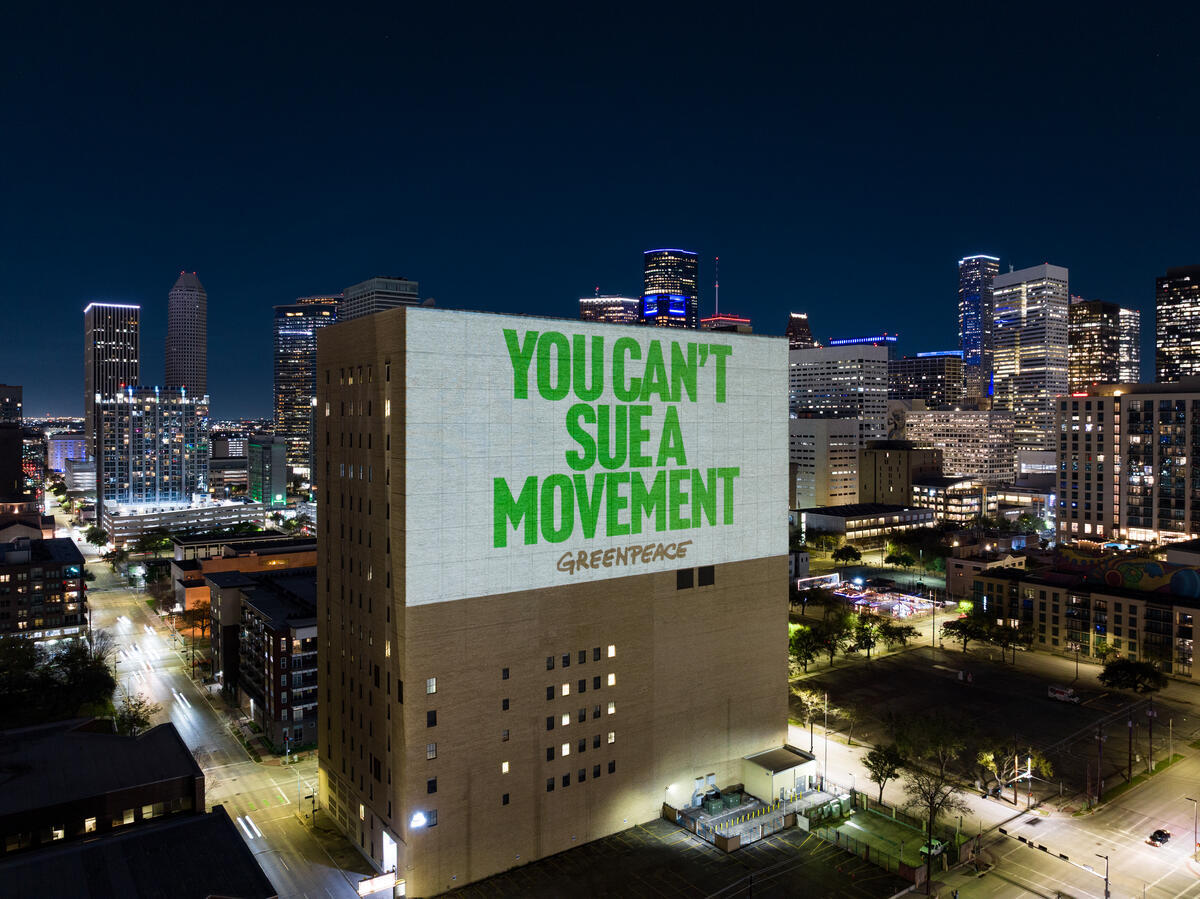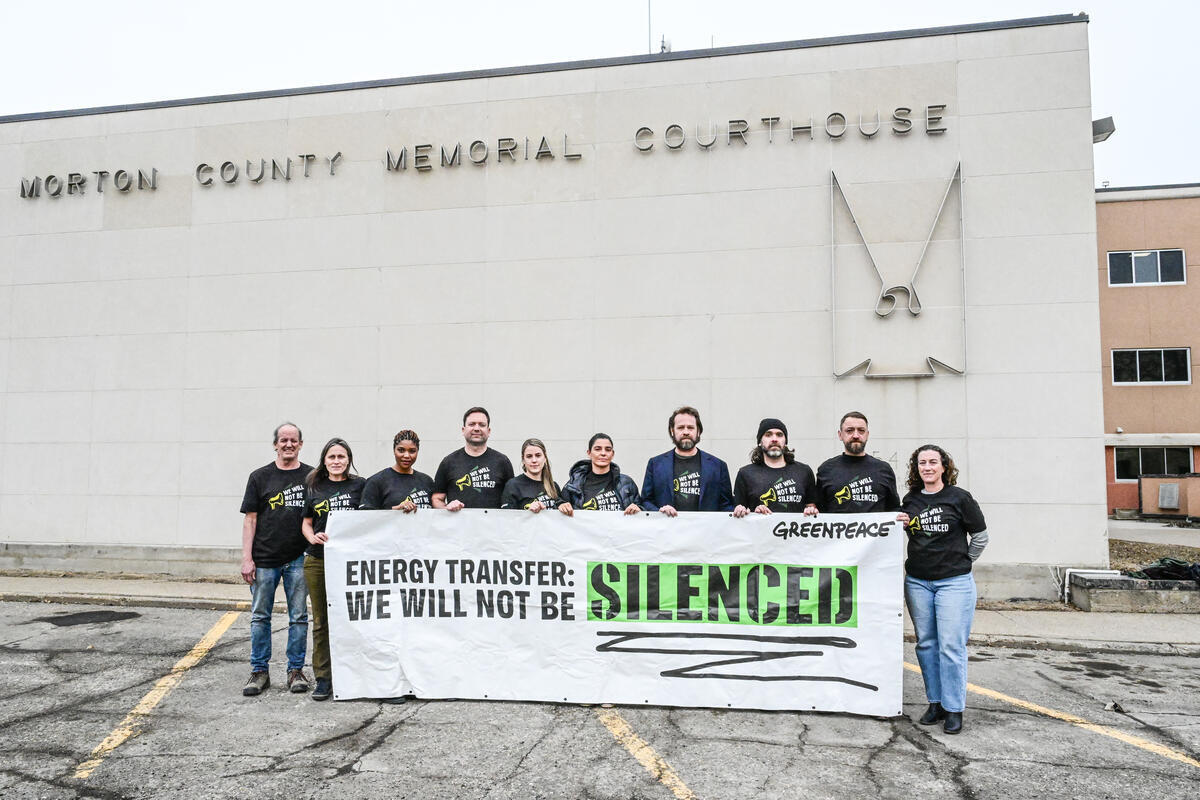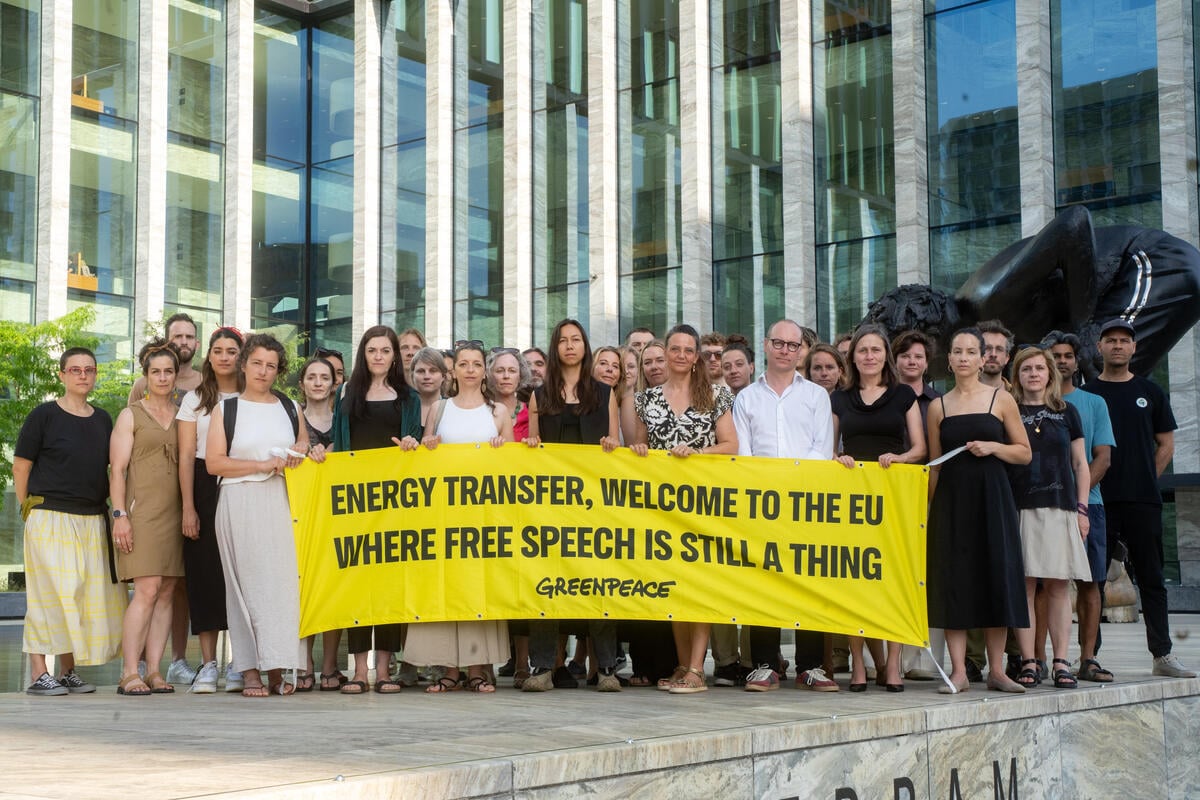Amsterdam, Netherlands – Greenpeace International’s landmark anti-intimidation lawsuit against Energy Transfer continues uninterrupted in the Netherlands after a North Dakota judge yesterday rejected the US-based fossil fuel pipeline company’s request for an anti-suit injunction, an attempt to avoid accountability under the European Union’s anti-SLAPP laws.[1][2] Greenpeace International’s lawsuit follows Energy Transfer’s back-to-back abusive lawsuits in the US and calls upon the EU’s anti-SLAPP directive.[3]
Mads Christensen, Executive Director, Greenpeace International said: “Energy Transfer won’t be able to bully its way out of facing accountability for its attacks on free speech. We will continue to resist all forms of intimidation and explore every option to hold Energy Transfer accountable for repeated attempts at silencing our free speech.
“Something absolutely vital is at stake in Greenpeace International’s groundbreaking anti-SLAPP case against Energy Transfer in the Netherlands: The ability of people to hold corporate polluters to account for the devastation they’re causing. We look forward to seeing Energy Transfer in court in Amsterdam.”
Energy Transfer, the pipeline company behind the Dakota Access Pipeline, asked North Dakota District Court Judge James D. Gion on 22 July 2025 to issue an anti-suit injunction protecting it from the anti-SLAPP lawsuit filed by Greenpeace International in the Netherlands.[4] Energy Transfer requested relief from the same North Dakota District Court that is still deciding on a final judgment in its pending intimidation lawsuit against Greenpeace International and Greenpeace entities in the US. Judge Gion has not yet delivered a final judgment in that case.[5]
Daniel Simons, Senior Legal Counsel Strategic Defense, Greenpeace International said: ”Energy Transfer’s aggressive attempt to stop Greenpeace International from pursuing justice and restitution under EU law is very much in character. After filing back-to-back abusive lawsuits in the US, Energy Transfer clearly fears a jurisdiction that has protections against abusive SLAPP lawsuits. These panicked moves show the power of the EU’s new anti-SLAPP directive is being felt. This legislation is intended to protect those who speak out for the public good from exactly the type of bullying lawsuit that Energy Transfer is waging in the US.”
Almost simultaneously with the North Dakota judge’s decision, Energy Transfer responded in Greenpeace International’s anti-SLAPP case in the Netherlands, filing a motion with the Amsterdam District Court with yet more attempts to avoid accountability under Dutch and EU law.[6]
Energy Transfer’s back-to-back SLAPPs are part of a wave of abusive lawsuits filed by Big Oil companies like Shell, Total, and ENI against Greenpeace entities in recent years. This includes Greenpeace France successfully defeating TotalEnergies’ SLAPP on 28 March 2024, and Greenpeace UK and Greenpeace International forcing Shell to back down from its SLAPP on 10 December 2024.
ENDS
Photos and videos are available in the Greenpeace Media Library.
Notes:
[1] District Court Opinion Denying Motion for Anti-Suit Injunction
[2] Greenpeace International sent a Notice of Liability to Energy Transfer on 23 July 2024, informing the pipeline giant of Greenpeace International’s intention to bring an anti-SLAPP lawsuit against the company in a Dutch Court. After Energy Transfer declined to accept liability on multiple occasions (September 2024, December 2024), Greenpeace International initiated the first test of the European Union’s anti-SLAPP Directive on 11 February 2025 by filing a lawsuit in Dutch court against Energy Transfer. The case was officially registered in the docket of the Court of Amsterdam on 2 July, 2025. Greenpeace International seeks to recover all damages and costs it has suffered as a result of Energy Transfers’s back-to-back, abusive lawsuits demanding hundreds of millions of dollars from Greenpeace International and the Greenpeace organisations in the US.
[3] Energy Transfer’s first lawsuit was filed in US federal court under the RICO Act – the Racketeer Influenced and Corrupt Organizations Act, a US federal statute designed to prosecute mob activity. The case was dismissed, with the judge stating the evidence fell “far short” of what was needed to establish a RICO enterprise. The federal court did not decide on the state law so Energy Transfer promptly filed a new case in a North Dakota state court with these and other state law claims. In the North Dakota state case, a Morton County jury found Greenpeace defendants liable for a perverse amount of damages, more than US$660 million, despite the lack of evidence presented during the trial.
[4] Notice of Plaintiffs’ Emergency Motion for Anti-Suit Injunction
[5] Still no evidence and still no final judgment in Energy Transfer lawsuit
[6] In a motion filed with the Amsterdam District Court on 9 September, 2025, Energy Transfer asked the Court to rule it has no jurisdiction to hear Netherlands-based Greenpeace International’s anti-SLAPP case, or in the alternative, to pause the case until the proceedings in North Dakota have concluded.
Contacts:
Greenpeace International Press Desk, +31 (0)20 718 2470 (available 24 hours), [email protected]
Join the Greenpeace SLAPP Trial WhatsApp Group for our latest updates



